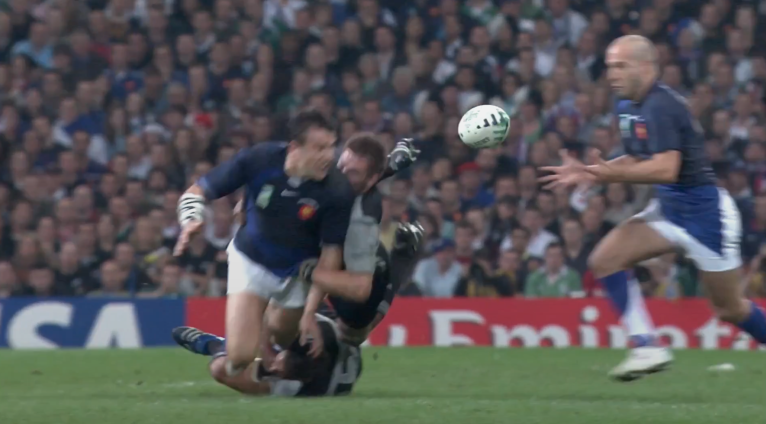Fred Michalak : « En Nouvelle-Zélande, on m’appelait ‘forward pass’ »

Il y a des souvenirs qui restent gravés en mémoire et le quart de finale de la Coupe du Monde de Rugby 2007 contre la Nouvelle-Zélande à Cardiff en fait partie. « Un match qui a marqué toute une génération ; je me souviens où j’étais quand j’ai regardé ce match », relève Mathieu Bastareaud dans le BastaShow.
En ouverture de la troisième saison à voir en exclusivité sur RugbyPass TV, l’ancien trois-quarts centre international a convié son ami Frédéric Michalak (42 ans) – 77 sélections comme demi d’ouverture du XV de France, devenu depuis entraîneur adjoint du Racing 92 – à faire le point sur l’actualité rugby, mais aussi à évoquer ses souvenirs.
Immanquablement, dans ce long entretien de près de 50 minutes, la discussion glisse sur le mondial 2007, le deuxième vécu par Michalak (après l’Australie en 2003) et ce moment d’anthologie que constitue aujourd’hui encore ce clash de Cardiff face aux All Blacks, mythique de bout en bout, depuis la réponse au haka jusqu’à la victoire 18-20 alors que les Bleus étaient menés 13-3 à la pause. C’était le 6 octobre 2007.
🇫🇷 Vous ne verrez rien de plus beau aujourd’hui 💥
Le mythique haka avant l’incroyable victoire de notre XV de France contre les All Blacks en 1/4 de la CDM 2007 🤩pic.twitter.com/XasefOw66l
— SPORTRICOLORE (@sportricolore) October 6, 2024
« J’ai souvent des frissons quand je croise des supporters français et qui viennent me parler de ce match de 2007 : ‘quand vous avez avancé face aux All Blacks, vous étiez tous en bleu-blanc-rouge, vous vous êtes retrouvés à 1 mètre’ », raconte le joueur.
« Je me souviens pas vraiment de qui a pris la décision de se mettre en bleu-blanc-rouge, d’avancer. On était tous unis là-dessus. Il fallait créer la surprise et il fallait montrer que nous, la France, on avance.
« Il y avait un message plus large que le simple rugby et ça nous a donné des coups de force. Quand tu regardes la Coupe du Monde dans la globalité, on n’a pas vraiment performé à part sur ce match-là. »
La passe de Damien Traille
Un autre moment a particulièrement marqué des générations de supporters, d’un bout à l’autre de la planète rugby, un infime instant qui mènera au deuxième essai des Bleus marquant leur remontada.
On est à la 68e minute du jeu. La France est alors menée 18-13 et Michalak vient de rentrer sur le terrain, en même temps que Christophe Dominici. Ce ballon qui va lui arriver entre les mains est son premier.
Sur une attaque de première main consécutive à une mêlée, Damien Traille est d’abord plaqué par le trois-quarts centre Luke McAlister, puis par Richie McCaw qui le met au sol. Traille parvient quand même à libérer le ballon et à le transmettre à Michalak qui arrive au soutien. Quelques mètres plus loin, Michalak est rattrapé à son tour et plaquée par Nick Evans qui le force à passer à Jauzion qui marque.
L’essai est validé par Wayne Barnes. Mais le ralenti diffusé dans le stade laisse penser à un en-avant de Traille à Michalak. 17 ans et un mois plus tard, le mystère n’est pas éclairci.
Le Basta Show est de retour ! ⚡️
Dans cet épisode, Fred Michalak revient sur le quart de finale victorieux des Bleus contre les All Blacks lors de la Coupe du monde 2007 et une soi-disant passe en-avant… 👀
L’épisode complet est à retrouver sur YouTube et RugbyPass TV 📺… pic.twitter.com/XyGymXu8lM
ADVERTISEMENT— RugbyPass FR 🇫🇷 (@RugbyPass_FR) November 5, 2024
« Après la Coupe du Monde, je suis parti en Afrique du Sud pour jouer avec les Sharks », raconte Michalak. « Et quand on partait en tournée, on jouait contre les Auckland Blues et d’autres. Et quand j’ai mis le pied en Nouvelle-Zélande, tout le monde m’appelait ‘Forward pass’, ‘passe en avant’. Imagine comme ça les a marqué ! »
Une question d’angle
Avec le recul, Michalak a sa propre idée sur l’action : « Damien Traille fait une passe. Il est en train d’avancer, mais il est plaqué. Et quand il est plaqué, on voit le ballon aller un peu vers l’avant. En fonction de l’angle de la caméra, on peut penser qu’il va en avant. Mais ça dépend de l’angle de la caméra. »
« Un peu comme la tentative d’interception d’Etzebeth », relève Bastareaud en référence au quart de finale de France 2023 contre l’Afrique du Sud.

« Pour Joe Rokocoko (qui était titulaire à l’aile ce jour-là, ndlr), qui travaille avec moi au quotidien (en tant qu’entraîneur-adjoint au Racing 92, ndlr), il y a en-avant. Pour moi, il n’y a pas en-avant », sourit Fred Michalak.
Le coup de pied magique à Vincent Clerc
Une autre action de la Coupe du Monde de Rugby 2007 est passée à la postérité, cette passe de l’extérieur du pied à Vincent Clerc contre l’Irlande, passe que l’on imagine dûment travaillée à l’entraînement.
Mais l’ancien ouvreur casse un mythe : « C’est l’inspiration », tranche Fred Michalak dans le BastaShow.
« Je pense surtout qu’on se connaissait avec Vincent, on jouait en club. Les associations en club parfois permettent cela.
« Sur le coup, je vois leur ailier défendre à l’intérieur de Ronan O’Gara. Je pense que leur stratégie était que leur troisième-ligne devait couvrir derrière le troisième rideau. Je pense qu’il s’est oublié parce qu’il poussait trop en mêlée. Avec Vincent, ça s’est fait avec le beau geste. »

